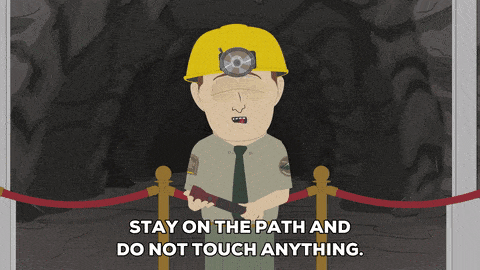According to studies, hiking has multiple physical and mental benefits reducing anxiety and preventing osteoporosis. It is a great way to get a good workout while also getting in touch with nature. Hiking is generally considered to be an eco-friendly activity, however, irresponsible practices of hikers have caused a lot of harm and left a lasting impact on the environment and local communities. Responsible hikers, as the term suggests, try their best to reduce their negative impact on the environment during their trips through the hiking trails. Being a responsible hiker is not an easy task, however, it isn’t an impossible thing to do.
Also read: 15 brilliant hacks every hiker needs to know
Let Us Now Have A Look At 10 Tips You Need To Follow To Become A Responsible Hiker
1. A Responsible Hiker Always Follows The Rules

Although this sounds very simple, it is one of the most difficult things to do. When visitors go to national parks or protected areas, they are usually handed information about the area upon entry. Sometimes, visitors are made to watch an informative video about the park, given leaflets to carry with them, and signs are put up along the way to instruct, inform and warn visitors. Quite often, many people either don’t pay attention or throw away informational leaflets without even reading them. Unfettered explorations are fine if you are in your own backyard or unrestricted areas, however, to be a responsible hiker, you need to religiously follow the rules specified by the authorities if you are going hiking in restricted areas.
While some rules like “don’t feed the wildlife” or “don’t litter” are common, some others are specific to the particular destination, like “don’t go hiking after dark”, “don’t light fires”, or group size and camping restrictions. The rules and guidelines may also contain information as to where you can find safe drinking water and even first aid facilities. So, you need to be attentive and respectful of the rules that have been laid down as they are meant to keep you as well as the area safe. These rules are in place not just to ensure your safety, but also to help you have the best experience. Additionally, some parks levy hefty fines for violations, so it is best to read through or pay attention to the rules and guidelines during briefings and follow them accordingly.
2. A Responsible Hiker Does Not Litter And Leaves No Trace

Some hikers have a habit of carrying with them plastic bottles, which are usually discarded along hiking trails or walking trails. While some of these are picked up by clean-up volunteers, good Samaritans, or cleaning crews, the discarded bottles pile up in hard-to-reach and remote parts of the hiking areas (like in the case of mountain hiking). Although some hiking areas do have waste disposal points, it is a challenge and is often a costly affair to remove waste when the park spans a very large area. As a responsible hiker, carry a reusable water bottle or a water bladder in your hiking backpack or hang it on your person so that you can fill it at mentioned points or water sources that have been marked as safe.
Additionally, if you have carried snacks with you, keep the wrappers, leftovers, and other trash with you till you exit the park instead of discarding it along the hiking trails. When it comes to toilet paper, make sure you use biodegradable toilet paper or carry a sealable bag so you can take your toilet paper with you to dispose of properly once you leave the natural trail. If you or your companions are smokers, take your cigarette butts with you when you leave to avoid starting an accidental fire.
The rule to remember here is that if you bring anything with you, those same things should leave the hiking areas with you. When you take your food crumbs and trash with you, you are preventing the wildlife from relying on visitors for their sustenance and stopping them from resorting to scavenging. Another responsible thing to do in order to effectively leave no negative impact is if you are carrying fruits and/or vegetables that are not endemic to the area, to make sure that you do not leave any seeds behind as they might have an adverse effect on the ecology of the area over a period of time.
As a responsible hiker, it is not always what you avoid leaving behind, but it can also be about what you take with you. By this, we mean pick up any pieces of trash that you might come across while hiking; only those that are reasonably within your reach. Be mindful of not going off the marked path or breaking any rules to do so. You can dispose of them properly once you leave the park or the nature trail.
3. A Responsible Hiker Sticks To The Marked Walking Trails

A good way to avoid having a negative impact as a responsible hiker is to stay on the marked paths and not wander off to explore on your own, especially in protected areas or national parks. Paths are marked for two reasons—visitors’ safety and minimising any damage that can be caused by people over a long period of time. By straying off the path, you can have a devastating impact on the environment, like trampling and killing nearby plants which are crucial to a healthy ecosystem in the area.
It may not seem like a big deal if one or two people walk off the marked walking trails at a time, but if you look at how many people actually pass through the area annually and how many of those thousands of people wander off the path, that casual stroll off the beaten path will stop looking harmless very fast. The only acceptable situations for one to walk off the marked hiking trails are when you are taking a long break or if you are going to the toilet. However, tread lightly and if possible, try not to trample on any plants.
4. A Responsible Hiker Respects The Wildlife And Enjoys The Sights Without Touching Anything

When you come across wildlife during your hike you must admire them from a distance and not approach or touch them. Generally, the larger or more dangerous the animal, the further away from them you should stay. If a small animal like a squirrel or an insect comes close to you, there is no need for you to run away or hide from them. However, if you are an animal lover, control the urge to touch them as they can be unpredictable. irresponsible behaviour around wildlife can prove dangerous and/or deadly for the hiker, as well as the animals. If you get bitten way out in remote areas, getting treatment in time may prove to be a challenge. However, the park that you are hiking in will provide you with information on how to deal with dangerous animals on the off-chance that you come across one in the wild.
Additionally, resist the urge to pluck beautiful flowers as they need to remain where they are for successful pollination. This way you will also avoid getting stung or bitten by any insect that might be hiding in the greenery. While keeping a safe distance, also be sure to stay quiet and keep a low profile so that you don’t scare the animals. If you are too loud or noisy, some animals may flee, leaving their young defenceless against predators.
If you are staying outdoors overnight, be sure to pack your food and scraps in sealed containers so that the animals (bears in particular) do not enter your campsite to scavenge. Always keep in mind that animals are not supposed to eat “human food” as it may prove detrimental to their health. Additionally, wild animals are not supposed to depend on humans for food.
5. A Responsible Hiker Is Careful While Lighting Fires

If you decide to camp out in the wild and want to light a fire, be responsible when you do so. Firstly, set up your tents only in designated campsites. If you are hiking in a hot and dry place, be a responsible hiker and don’t light a fire unless there is a proper fire pit. Also, be mindful of fire warnings. This is because there is a greater risk of campfires leading to wildfires, especially in hot and dry conditions. Even if you are lighting a cigarette, as mentioned before, put out the butt properly, pack it up, and take it with you when you leave to avoid any unintentional fires.
6. A Responsible Hiker Is Careful About Water Resources

It is not feasible for one to carry lots of bottled water in a hiking backpack, especially if you are out hiking for many days. You will need to carry refillable water bottles that, preferably, have a filter attached. When you come across a river or a lake while hiking through forests or mountains, be responsible and take steps to avoid contaminating them as they are an important source of drinking water, especially for hikers. Don’t wash your dishes, clothes, or even yourself directly in the river, lake, or other water source. Avoid using soaps as even the biodegradable ones can be harmful to the environment. Always carry the water away from the source and then use it for whatever purpose, be it cooking or washing. If you are evacuating your bowels, be sure to do it far away from the water source.
If you want to drink from the source, first ask if it is safe, or refer to the informational leaflets given to you by the park authorities. Even if the water is safe to drink, boil it or use purification tablets before you drink the same as you don’t want to cut your hiking trip short just because you got sick from drinking contaminated water.
7. A Responsible Hiker Hires Local Guides And Deals With Responsible Operators

If you are hiking by yourself or with a group and want to learn as you hike, hire a local guide or find a responsible local operator. Being a responsible hiker, much like being a responsible traveller, involves supporting local communities in one way or another. If you are choosing to go with a local company, do your research and make sure that they follow sustainable and responsible travel standards.
You can find out about the company by checking out its website or looking for reviews from its previous customers online. Once you have finished the hike, be sure to tip your guide and the support staff. Local guides will enhance your hiking experience by telling you stories about the local customs and sharing with you tips for your next visit. It is always better to hike with a guide as they can help you if something goes wrong. If you have a guide, you can also avoid getting lost.
8. A Responsible Hiker Carries The Right Hiking Gear

The things you pack in your hiking backpack will determine the outcome of your hiking experience. Carrying the right hiking gear can save you from having a miserable trip and even from danger. If something goes wrong when you step out to hike, like getting lost or injured, you cannot depend solely on emergency services, especially if you are in a remote hiking area. Don’t forget that some search and rescue team members have even lost their lives looking for injured and/or lost hikers. As a responsible hiker, you need to foresee all reasonable mishaps and prepare for the same by carrying the appropriate gear. When you go hiking, be sure to carry the ten essential items, namely water, shelter, food, a knife, sun protection, fire-starting materials, a first aid kit, warm clothing, navigation tools, and a headlamp. Make sure that you pack light.
9. A Responsible Hiker Understands Their Limits And Takes Responsibility For Their Own Safety

Being a responsible hiker also means that you do not go out of your way to put yourself and others by pulling death-defying stunts. By carrying the essentials (as mentioned above), following the rules, and sticking to the path, you will remain safe and avoid causing unnecessary panic and expenditure by the emergency services. When you are on a mountain hiking or walking on a nature trail, be sure to stay updated about the conditions to decide whether or not to continue. Carry a map so you know where you are going or hire a local guide. Also, keep your family and friends updated so they know your route and the approximate time when you will return (whether or not you are hiking alone).
10. Responsible Hiker Camps Only In Designated Areas

If your hiking trip lasts for a few days, you will have no other choice than to set up camp if there are no settlements nearby when night falls. In restricted areas and national parks, you will find designated camping areas to set up your tent and rest for the night. Even though other hikers may be at the campsite and you might feel like it is crowded, campsites are made for several reasons, one of which is your safety. While setting up tents can damage the plants and disrupt animal habitats, a designated campsite will ensure that the damage does not extend beyond a certain area.
When camping in areas that are not national parks or protected areas, avoid camping in places where there are signs that someone has just camped there recently. Also, move your tent every two days or so, so that you give the vegetation a chance to recover instead of being completely destroyed by repeated trampling. Be sure to not leave a trace of your presence, like trash, cigarette butts, or leftover food. Also, avoid cutting trees and set up your camp at least 200 feet away from any water source in order to avoid contamination of the water body.
Be A Responsible Hiker. Leave Behind Joy, Not Devastation
Being responsible in anything you do may seem difficult unless you practice it so much that it becomes a part of you. By being a responsible hiker, you are not just creating happy and memorable moments for yourself, but also for the local communities and the environment. Regardless of whether you are going to hike, travel, or tour, make sure that you have a positive impact on everyone and everything with which you come in contact.
Also read: 16 incredible virtual hiking trails from around the world


